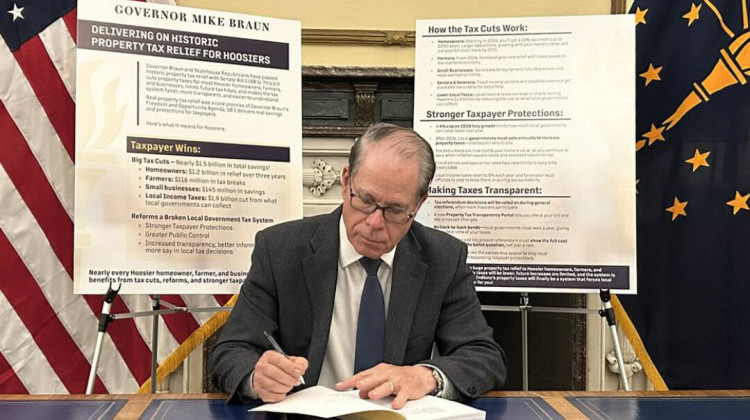
Office patrol the grounds of the federal prison in Terre Haute, Ind., is shown Monday, July 13, 2020.
AP Photo/Michael ConroyMICHAEL BALSAMO and MICHAEL TARM - Associated Press
TERRE HAUTE, Ind. (AP) — A judge on Wednesday halted the execution of a man, said to be suffering from dementia, who had been set to die by lethal injection in the federal government’s second execution this week after a 17-year hiatus.
Wesley Ira Purkey, convicted of a gruesome 1998 kidnapping and killing, was scheduled for execution Wednesday night at the U.S. Penitentiary in Terre Haute, Indiana, where Daniel Lewis Lee was put to death Tuesday after his eleventh-hour legal bids failed.
U.S. District Judge Tanya Chutkan in Washington, D.C., imposed two injunctions prohibiting the federal Bureau of Prisons from moving forward with Purkey’s execution. The Justice Department immediately appealed in both cases. A separate temporary stay was already in place from the 7th U.S. Circuit Court of Appeals in Chicago.
The legal wrangling suggested a volley of litigation would continue in the hours ahead of Purkey’s scheduled execution, similar to what happened before the government executed Lee following a ruling from the Supreme Court. One of the injunctions imposed Wednesday halts not only Purkey's execution, but another scheduled for Friday and one in August.
Lee, convicted of killing an Arkansas family in a 1990s plot to build a whites-only nation, was the first of four condemned men scheduled to die in July and August despite the coronavirus pandemic raging inside and outside prisons.
Purkey, 68, of Lansing, Kansas, would be the second.
“This competency issue is a very strong issue on paper,” said Robert Dunham, executive director of the Death Penalty Information Center. “The Supreme Court has halted executions on this issue in the past. At a minimum, the question of whether Purkey dies is going to go down to the last minute.”
Judge Chutkan didn't rule on whether Purkey was competent but said the court needed to evaluate the claim. She said there was no question he'd suffer “irreparable harm” if he was put to death before his claims could be evaluated.
Lee’s execution had gone forward a day late. It was scheduled for Monday afternoon, but the Supreme Court only gave the green light in a 5-4 ruling early Tuesday.
Repeatedly on Wednesday, a federal judge also denied a request from Dustin Lee Honkin, an Iowa drug kingpin scheduled to be executed on Friday, to delay his execution. The judge said he would not delay Honken’s execution date due to the coronavirus pandemic and said the Bureau of Prisons was in the best position to weigh the health risks.
The issue of Purkey’s mental health arose in the runup to his 2003 trial and when, after the verdict, jurors had to decide whether he should be put to death in the killing of 16-year-old Jennifer Long in Kansas City, Missouri. Prosecutors said he raped and stabbed her, dismembered her with a chainsaw, burned the body and dumped her ashes in a pond in Kansas. Purkey was separately convicted and sentenced to life in the beating death of 80-year-old Mary Ruth Bales, of Kansas City, Kansas.
But the legal questions of whether he was mentally fit to stand trial or to be sentenced to die are different from the question of whether he's mentally fit enough now to be put to death. Purkey’s lawyers argue he clearly isn't, saying in recent filings he suffers from advancing Alzheimer’s disease.
“He has long accepted responsibility for the crime that put him on death row,” one of this lawyers, Rebecca Woodman, said. “But as his dementia has progressed, he no longer has a rational understanding of why the government plans to execute him.”
Purkey believes his planned execution is part of a conspiracy involving his attorneys, Woodman said. In other filings, they describe delusions that people were spraying poison into his room and that drug dealers implanted a device in his chest meant to kill him.
While various legal issues in Purkey’s case have been hashed, rehashed and settled by courts over nearly two decades, “competency is something that is always in flux,” so the issue of mental fitness for execution can only be addressed once a date is set, according to Dunham, who teaches law school courses on capital punishment.
In a landmark 1986 decision, the Supreme Court ruled the Constitution prohibits executing someone who lacks a reasonable understanding of why he's being executed. It involved the case of Alvin Ford, who was convicted of murder but whose mental health deteriorated behind bars to the point, according to his lawyer, he believed he was pope.
“I could say I was Napoleon,” Dunham said. “But if I say I understand that Napoleon was sentenced to death for a crime and is being executed for it — that could allow the execution to go ahead.”
Purkey’s mental issues go beyond Alzheimer’s, his lawyers have said. They say he was subject to sexual and mental abuse as a child and, at 14, was diagnosed with schizophrenia, bipolar disorder, major depression and psychosis.
Last week, three mental health organizations urged U.S. Attorney William Barr to commute Purkey's sentence to life in prison without possibility of parole. The National Alliance on Mental Illness, Mental Health America and the Treatment Advocacy Center said executing mentally ailing people like Purkey “constitutes cruel and unusual punishment and does not comport with ‘evolving standards of decency.’”
Glenda Lamont, the mother of the slain teenager, told The Kansas City Star last year she planned to attend Purkey’s execution.
“I don’t want to say that I’m happy,” Lamont said. “At the same time, he is a crazy madman that doesn’t deserve, in my opinion, to be breathing anymore.”
President Donald Trump’s campaign touted the Lee execution in an email blast, saying the president “Ensured Total Justice for the Victims of an Evil Killer” and demanded his political opponent Joe Biden explain why he now opposes capital punishment.
There was an unofficial moratorium on federal executions after the Obama administration ordered a review in 2014 following a botched execution in Oklahoma.
Associated Press writers Roxana Hegeman in Wichita, Kansas, and Mark Sherman and Colleen Long in Washington contributed to this report.
 DONATE
DONATE






 Support WFYI. We can't do it without you.
Support WFYI. We can't do it without you.